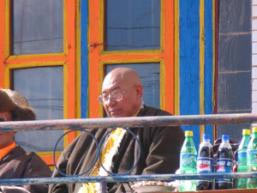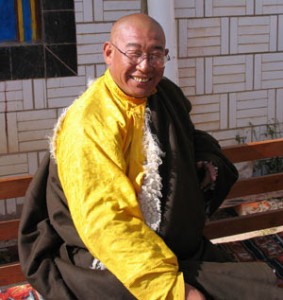 Phurbu Rinpoche heads Pangri nunnery. His detention last May is believed to be linked to last year’s peaceful protest by some 80 Pangri nuns.  A Tibetan source with connections in the area described Phurbu Rinpoche as having “extremely high prestige among the local people, and he is a well-respected and well-loved religious figure.” |
A Chinese lawyer has taken the unprecedented step of speaking out about a trial on Tuesday April 21 of a respected Tibetan lama, Phurbu Rinpoche, detained last May and facing charges that could lead to a lengthy prison sentence. His Beijing-based lawyer Li Fangping told the Associated Press in a telephone interview on Tuesday that Phurbu Rinpoche, who is highly respected in his local community, is accused of illegally possessing weapons but that he believes he was framed. Security was stepped up in the area due to the trial today, and no verdict has yet been reached. This is the first known case of a prominent Tibetan religious leader being sentenced since the protests began across Tibet in March, 2008, and the first time that a defendant in a case connected to the protests is known to have been assigned a defense lawyer of their or their familyís choice.
Fifty-two year old Phurbu Rinpoche heads a nunnery, Pangri, in Kardze (Chinese: Ganzi) Tibet Autonomous Prefecture, Sichuan province, and he has many Chinese devotees. His detention last May is believed to be linked to a peaceful protest by more than 80 Pangri nuns a few days earlier against the crackdown by the Chinese authorities. Phurbu Rinpoche, an incarnate lama of Trehor Kardze monastery who lives in Dragyab village, Kardze, was taken into custody on May 18, 2008. His lawyer says that he was severely tortured for four days and nights upon detention, pointing out that under Chinese law it is illegal for charges to be based on confessions extracted under torture.
During the trial on Tuesday in Kangding (Tibetan: Dartsedo), a Tibetan area of Sichuan province, Phurbu Rinpoche, speaking in Chinese, denied the two charges against him, saying that the arms and explosives found in his home had been put there to frame him. Lawyer Li Fangping said that the court had made no investigation into where the weapons and explosives had come from.
Security was stepped up for the trial, with strengthened traffic control outside the courtroom and an increased deployment of People’s Armed Police vehicles and personnel in the town. There were fears locally that the trial would lead to further unrest among Tibetans. According to Tibetan sources, following Phurbu Rinpoche’s detention last year, Pangri nuns and residents of a nearby old people’s home founded by the Rinpoche had protested again demanding his release, and were detained. Tibetan nuns have taken a leading role in dissent in Kardze prefecture, with approximately 100 nuns from the area believed to be still in detention following peaceful protests that continued despite the severe and ongoing ‘anti-separatist’ crackdown in Tibetan areas.
The Chinese lawyer representing Phurbu Rinpoche, a well-known public defender, said that if convicted of the crimes as charged, Phurbu Rinpoche could be sentenced to between five and 15 years. He also referred to fears that a sentence could lead to further unrest in the area.
An official court notice posted outside the court and dated April 16 stated the following: “On the date April 21, 2009 as set by this court, the defendant Phurbu Rinpoche will be tried in public at Kardze Prefecture Intermediate People’s Court in a case of seizing and occupying state property, and illegal possession of weapons and explosives.” According to one Tibetan source, the charge regarding state property is also regarded to be of little substance and possibly refers to the elderly people’s home set up by the Rinpoche.
According to a source, seven family members were in attendance at the trial on Tuesday including Phurbu Rinpoche’s wife who was extremely distressed and crying throughout. No verdict was reached, but lawyer Li Fanping said that he feared that a sentence would definitely be passed later.
The charges against Phurbu Rinpoche, as well as his background as an influential and respected leader of the community, are similar to those leveled at Tenzin Deleg Rinpoche, serving a life sentence after being charged with “causing explosions [and] inciting the separation of the state” in 2002. Tenzin Deleg Rinpoche, a well-known and respected lama, was originally sentenced to death that was later commuted to life at the Kardze Tibetan Autonomous Prefecture Intermediate People’s Court. His current welfare is unknown. He was detained on charges widely believed to be false of possessing explosives, which were allegedly found at his monastery.
More than 20 old men and women live in the old people’s home founded by Phurbu Rinpoche, and he has also adopted many orphans and disabled children and provided the opportunity for children of poor families to go to school. A Tibetan source with connections in the area said: “He enjoys extremely high prestige among the local people, and he is a well-respected and well-loved religious figure.” Phurbu Rinpoche’s many Chinese devotees set up the online network http://www.burongna.net to support his work.
Eighty nuns from Pangri nunnery, in Su-ngo township, Kardze, staged a demonstration on May 14, 2008, voicing their distress at the crackdown, detentions and disappearances that have followed peaceful protests in different areas of the Tibetan plateau, as well as resentment against the implementation of the ‘patriotic education’ campaign by the Chinese authorities. The nuns from Pangri, headed by Phurbu Rinpoche, gave the following reasons for their protest: “It is better to die than to denounce, criticize and attack the Dalai Lama, to sign official documents denouncing the Dalai Lama, if there is no place for us to worship and live, let us go somewhere else or die, if the Chinese authorities kill us, let us be killed, we have no regrets.” (Tibetan Center for Human Rights and Democracy).
On the afternoon of May 14, 2008 the nuns marched peacefully towards the Kardze county government headquarters chanting slogans calling for the Dalai Lama’s return to Tibet. They were detained as soon as they approached the building and taken away in police vehicles. Many of the nuns were seen by witnesses to be severely beaten, with stains of blood seen in the street after they were taken away. A few days later and following a raid by armed police on Phurbu Rinpoche’s home resulting in his detention, some of the nuns who remained at Pangri also protested and were detained.

